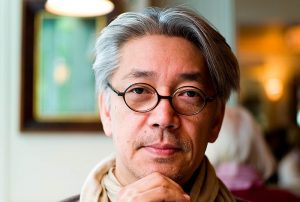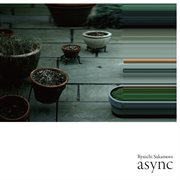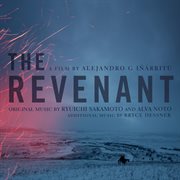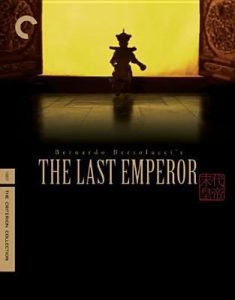In memory of composer Ryuichi Sakamoto

Photo by Joi Ito, CC BY 2.0 via Wikimedia Commons
On March 28 the world lost a huge talent in musician, composer and actor Ryuichi Sakamoto, 71. After having recovered from tonsil cancer in 2015, he announced two years ago that he would be living with colon cancer but, "hoping to make music for a little while longer." And indeed, he continued to release several great works in the last few years.
Born and raised in Tokyo, Sakamoto began learning piano at a young age. His early influences like the Beatles and Rolling Stones were matched by Debussy and John Cage (whom he eventually worked with). This mix of pop and classical came to define his outlook and work. Another element present in so much of his output was a spirit of collaboration. Be it other musicians, groups, filmmakers, TV and game developers, he worked with creatives from all over the world and all forms of art. A graduate of the Tokyo University of the Arts, Sakamoto studied classical and world music. While in school he was in jazz and folk bands, but his trio would catapult him to rockstar status.
As a bandmate
 Sakamoto found international fame in the electronic pop trio Yellow Magic Orchestra. YMO formed in 1978 with drummer Yukihiro Takahashi (who sadly died in January) and guitarist Haruomi Hosono. The latter already had some success with groups like Happy End, sometimes called the Japanese Beatles. These three proved to be the right people in the right place at the right time.
Sakamoto found international fame in the electronic pop trio Yellow Magic Orchestra. YMO formed in 1978 with drummer Yukihiro Takahashi (who sadly died in January) and guitarist Haruomi Hosono. The latter already had some success with groups like Happy End, sometimes called the Japanese Beatles. These three proved to be the right people in the right place at the right time.Sakamoto's use of new synthesizer tech from Japanese companies like Yamaha, Roland and KORG was pioneering. His use of simple, catchy melodies using computerized tones was hugely influential in the new field of video game music in Japan. (This year video game music finally earned its own Grammy award.) The band played at the Greek Theater in L.A. and appeared on Soul Train. Their song "Firecracker" was sampled by Afrika Bambaata early in rap's history and Jennifer Lopez's "I'm Real."
As a solo artist
 After the massive success of Yellow Magic Orchestra, each band member went their separate ways to start solo careers in the early '80s. (Takahashi's Japanese electronic supergroup Metafive is worth a listen.) Sakamoto's first albums remained rooted in synth-heavy electronic music, but had a timeless and eclectic quality that hinted at larger aspirations. He incorporated instrumentation and styles from all over the world.
After the massive success of Yellow Magic Orchestra, each band member went their separate ways to start solo careers in the early '80s. (Takahashi's Japanese electronic supergroup Metafive is worth a listen.) Sakamoto's first albums remained rooted in synth-heavy electronic music, but had a timeless and eclectic quality that hinted at larger aspirations. He incorporated instrumentation and styles from all over the world.Sakamoto also worked more with traditional piano than with synths. In fact, several of his later albums, if not solo piano, are more and more sparse. A defining characteristic of his style is his interest in minimalist compositions. Often his melodies are strikingly beautiful but allow quiet, space, softness and silence to play a large part. In others, he uses dissonance and more avant-garde sounds from classical music.
 Part of the timeless quality of his work is the fact that Sakamoto often returned to his own pieces. On a single album like BTTB (Back to the Basics), he included new songs, YMO songs, film scores and older solo songs. He re-contextualized them, even encouraged remixing or covering of his work by newer artists like his 2017 album async and the companion async remodels. Through the years, he collaborated with David Sylvian, Brian Wilson, Robbie Robertson, Iggy Pop, Bootsy Collins, Tony Williams and many more.
Part of the timeless quality of his work is the fact that Sakamoto often returned to his own pieces. On a single album like BTTB (Back to the Basics), he included new songs, YMO songs, film scores and older solo songs. He re-contextualized them, even encouraged remixing or covering of his work by newer artists like his 2017 album async and the companion async remodels. Through the years, he collaborated with David Sylvian, Brian Wilson, Robbie Robertson, Iggy Pop, Bootsy Collins, Tony Williams and many more.As film composer and actor
 In the midst of his group and budding solo career, director Nagisa Oshima approached Skamoto to star in Merry Christmas, Mr. Lawrence. The WWII film cast him as the leader of a Japanese POW camp opposite David Bowie as a South African prisoner. While shooting, Sakamoto propositioned the director to let him score the soundtrack. The title track went on to become one of Sakamoto's most indelible songs. It also launched a career as a soundtrack composer. In 1987, he once again starred in and composed the film The Last Emperor. It sweeped the Academy Awards that year, netting Sakamoto an Oscar for Best Original Score (along with the Talking Heads' David Byrne and Cong Su).
In the midst of his group and budding solo career, director Nagisa Oshima approached Skamoto to star in Merry Christmas, Mr. Lawrence. The WWII film cast him as the leader of a Japanese POW camp opposite David Bowie as a South African prisoner. While shooting, Sakamoto propositioned the director to let him score the soundtrack. The title track went on to become one of Sakamoto's most indelible songs. It also launched a career as a soundtrack composer. In 1987, he once again starred in and composed the film The Last Emperor. It sweeped the Academy Awards that year, netting Sakamoto an Oscar for Best Original Score (along with the Talking Heads' David Byrne and Cong Su).After such high-profile wins, Sakamoto was invited to open the 1992 Barcelona Olympics. He went on to score many more films and even a few video games in the years since. Sakamoto collaborated frequently with directors Bernardo Bertolucci and Brian De Palma. He even scored a single episode of the Netflix series Black Mirror.
In 2015 Sakamoto was nominated for an Oscar again for The Revenant, along with Alva Noti. Although he rarely acted again outside those first two big roles, he was the subject of the documentary Ryuichi Sakamoto: Coda. The 2018 film focuses on his work after his cancer diagnosis and his activism against nuclear power after the Fukushima disaster.
“I was born in Japan but I don’t think I’m Japanese. To be a stranger – I like that attitude. I don’t like nationalities and borders.” - Ryuichi Sakamoto in 1988
A legacy of inspiration
There's no doubt that Ryuichi Sakamoto has left a void in his passing. Lots of musicians wrote memorials online upon news of his passing in the last few weeks. You can be sure with just a few more years, we'd have a wealth of additional music from a man who never stopped creating. But we should count ourselves lucky he created so many moving pieces in his time. You may have already heard his music somewhere before. One thing we can be sure of is that his works will continue to inspire listeners for ages to come.















